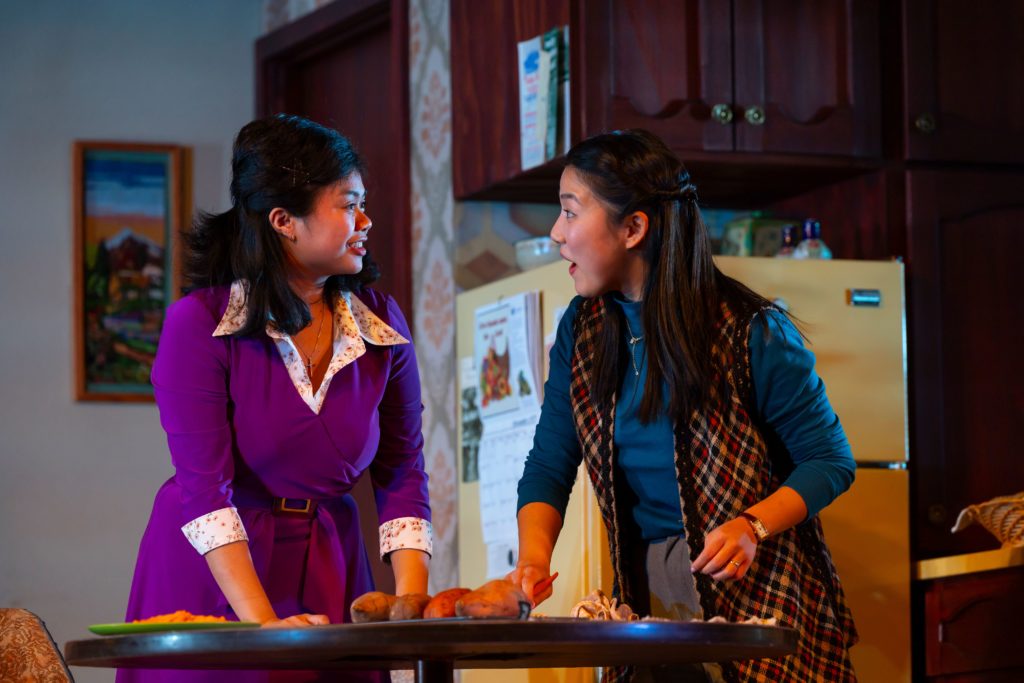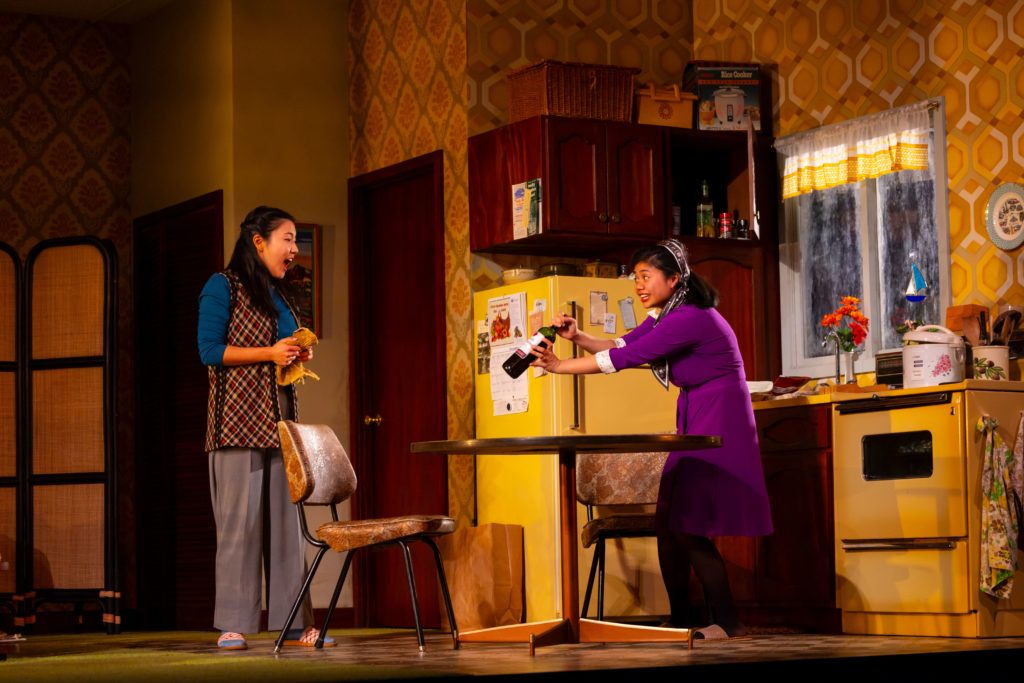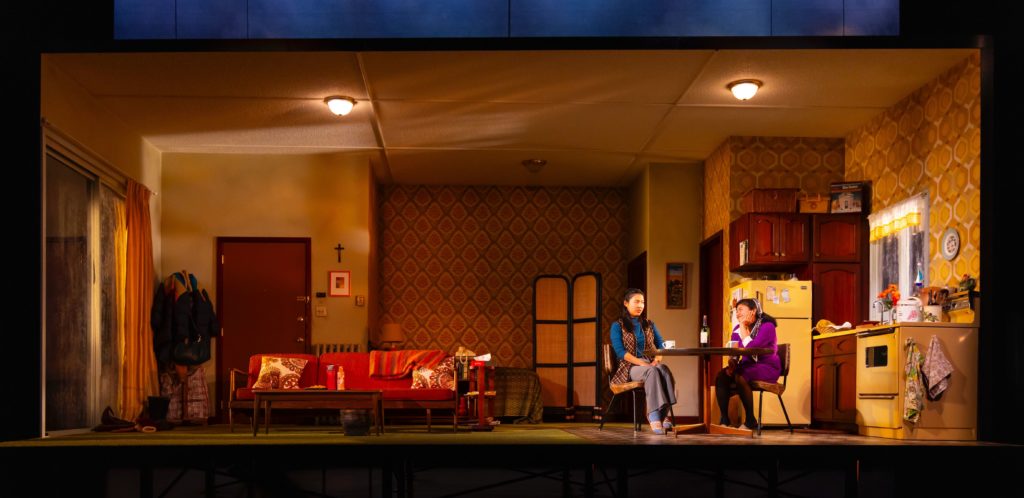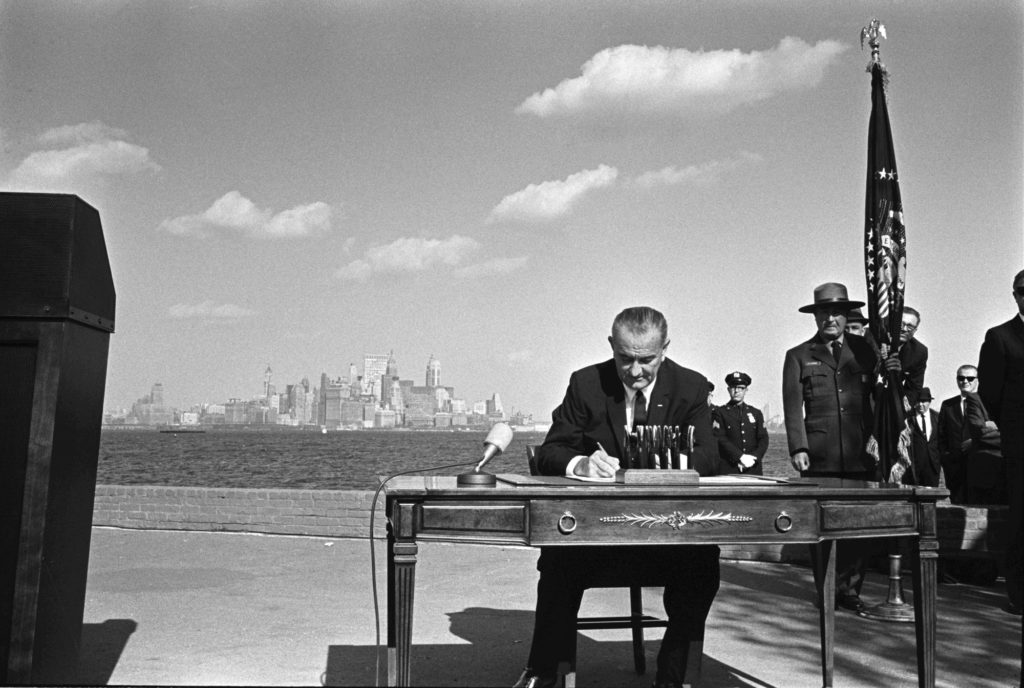
Jenna Agbayani and Judy Song; photo T Charles Erickson.
Presented by The Huntington
By Lloyd Suh
Directed by May Adrales
Sound Design and Original Music by Fabian Obispo
Dramaturgy by Christine Mok
Dialect coaching by Joy Lanceta Coronel
Starring Jenna Agbayani and Judy Song
Featuring Matt Goldstein as the Radio DJ voiceover
Tuesday, November 21 – Saturday, December 23, 2023
Calderwood Pavilion at the BCA
527 Tremont St.
Boston, MA 02116
Review by Kitty Drexel
BOSTON — The Huntington presents The Heart Sellers by Lloyd Suh at the Calderwood Pavilion at the BCA now through December 23. It is directed by May Adrales with original music by Fabian Obispo. It stars Jenna Agbayani and Judy Song and features Matt Goldstein as the Radio DJ.
It is Thanksgiving 1973. Pres. Richard Nixon told the Associated Press that he wasn’t a crook. Henry Kissinger started his term as Secretary of State. A Charlie Brown Thanksgiving premiered on CBS. Millions of families celebrate the holiday with loved ones over turkey and congested driving conditions.
We meet new friends Luna (Jenna Agbayani) and Jane (Judy Song) as they sit together for the first time. Their husbands are working during the holiday at the same hospital in different departments. Luna saw Jane in the grocery store, recognized a kindred spirit, and invited her over to cook Luna’s first turkey.
The Heart Sellers contextualizes these pilgrims’ first Thanksgiving as a holiday of new traditions in the US, a cultural melting pot. Luna and Jane are Asian immigrants who have fled political violence in their own countries for new opportunities for their absentee husbands in the US. They bond over shared loneliness, homesickness, culture shock, vivid daydreams, and mugsful of wine.
Luna and Jane (after Jane Fonda) are the women you don’t read about when you read about the influx of immigrants in the 1960s. President Lyndon B. Johnson signed the Immigration and Nationality Act, known as the Hart-Celler Act, into law on Oct. 3, 1965. It abolished the previous racist immigration laws and allowed immigrants to enter the US based on skills and family relationships (vs. skin color).
History overflows with stories of male immigrants and their families who come to make a better life in the US. The Heart Sellers is about the women, wives, and mothers, who stayed at home while their husbands worked.
America’s first-wave feminism focused on the right to vote and own property. It was deeply, maddeningly white.
The second-wave dismantled stifling gender roles of women and men and gained traction alongside the Civil Rights Movement. Books such as Betty Friedan’s The Feminine Mystique and Simone de Beauvoir’s The Second Sex were highly circulated. Oral contraception became available. The Equal Pay Act was passed in 1963.
These cultural cornerstones were readily circulable to English speakers. Women isolated by immigration status and language barriers such as Luna and Jane may or may not have known it existed. Second-wave feminism included Black women such as Audre Lorde, Angela Davis, and bell hooks but didn’t prioritize issues of racial equity.
Luna and Jane discuss feminist issues such as the dearth of women in politics, their lonely roles as housewives, a lack of community, and husbands who don’t listen to their opinions or respect their choices. The Heart Sellers gently, quietly takes up the mantle of intersectional feminism.
Playwright Suh lets them question their decision to follow their husbands and their frustration that there isn’t more for them than cooking, cleaning, and waiting for their husbands to come home. As Betty Friedan argued, it’s not satisfying; it’s not enough. They are more than incubators for capitalism.

Photo by T Charles Erickson
Jenna Agbayani and Judy Song are triumphantly realistic as two strangers embracing a strange, unlikely situation. Agbayani plays Luna with resilient perkiness. This is a woman who meets the world smile first. Song tackles Jane with solemn unflappability. She isn’t a person to get mired in emotions.
Together, they show us that strength comes in many forms. Luna and Jane have vastly different approaches to life, but they see each other clearly as potential allies in the same adventure. Suh’s writing and Adrales’ direction show us how these women grow to trust each other. It’s the work of Agbayani and Song that makes the women lovable and memorable.
The dialect coaching by Joy Lanceta Coronel adds layers to the actress’s storytelling. When we hear their characters’ accents, we remember that it’s 1973. Luna and Song face an uphill battle as immigrants with no direct comparison to today’s difficulties. These strong, resilient women have few city resources. It’s wondrous that they now have each other.
Dramaturg Christine Mok developed informative essays and interviews for this production that inspire compassion for Suh’s characters. Mok’s interview with Suh personalizes his play for us and gives us context for his writing. Under it are anecdotes from Adrales and Suh about their family’s Thanksgiving traditions.

Photo by T Charles Erickson
Mok’s interview with designer Junghyun Georgia Lee describes the set design process and why the audience feels so despondent looking at the set. On the next page, Mok’s personal essay about growing up as a child of the Hart-Celler Act. These artists let us into their lives, and it gives The Heart Sellers greater depth.
Assistant Director Jenny Lee interviews Director Adrales on the page after the welcome note to patrons. We’re given insight into Adrales’ direction and her philosophy on the theatre. Adrales advises AAPI directors in the last paragraph to soak up as much art from artists they admire as they can. “The richer you are on the inside, the more your work will shine,” she says. This is universally good advice for all artists.
The world of The Heart Sellers is insular; the characters exist inside a studio apartment. The set design by Junghyun Georgia Lee and the lighting design by Kat C Zhou remind us that there’s a world outside Luna’s grimy porch windows. Light streams through the window and washes the battered furniture with the November sun.
The Heart Sellers is a about a whole-hearted welcome between two new friends. They see each other for who they are, not what they can gain. At a time when the world is at its most distrustful, a play about a leap of faith and inviting new traditions is refreshing.

LBJ signing the Hart-Cellers Act in 1965. LBJ Library photo by Yoichi Okamoto.
“Over my shoulders here you can see Ellis Island, whose vacant corridors echo today the joyous sound of long ago voices. And today we can all believe that the lamp of this grand old lady is brighter today—and the golden door that she guards gleams more brilliantly in the light of an increased liberty for the people from all the countries of the globe.”
-President Lyndon B. Johnson, Oct. 3, 1965, after signing the Hart-Celler Immigration Act.
